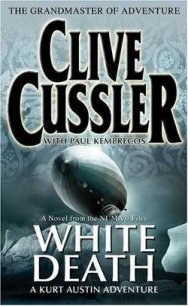Corsair - Cussler Clive (полная версия книги TXT) 📗
“Was there any other clue in the letter? Something insignificant, even.”
“Henry Lafayette said it was hidden in a large cavern that was accessible only through the use of, and I quote here, ‘a clever device.’ Please don’t ask me what that means. Alana pestered me for weeks on end about it. The only other thing I have is a local legend that the ship is hidden beneath the black that burns.”
“The what?” Linda asked.
“The black that burns. The tale comes from the journal of Al-Jama’s second-in-command, Suleiman Karamanli. It survived because he happened to be the Bashaw of Tripoli’s nephew, so it was housed with the Royal Archives. What it means, I’m afraid, is beyond me. I am sorry.”
“So am I,” Linda muttered.
If a trained archaeologist like Alana Shepard couldn’t find Al-Jama’s ship after spending weeks using sophisticated equipment, there was little hope she and Mark and Linc would discover it in the remaining days before the peace conference.
Linda glanced at her watch. They had an hour to hike back to where they were going to rendezvous with Mark and the Pig. After reporting that they’d struck out with Bumford, she was going to tell Max their best course of action now was to prestage the Pig to Juan’s location in the hope that the Chairman had had better luck.
“Come on, Linc,” she said. “Dr. Bumford, thank you for your time. And I don’t think I need to remind you that we were never here.”
“Yes, of course,” the scholar said. “By the way, have you found any sign of the rest of my team?”
Linda bit back a barb about his concern for the others being an afterthought. “One of the men is dead. Either Greg Chaffee or Mike Duncan. Single gunshot to the head. The vultures didn’t leave enough to make an ID. We don’t know about the other two.”
“Dear God. Is it safe for me to remain here? Maybe I should return to the States.”
Linc grabbed her arm before she decked the Ottoman scholar. “Easy, girl. He ain’t worth it. Let’s go.”
The two of them slipped out the back of the tent and made their way across the quiet camp. Neither noticed the small figure of a boy who’d listened to the conversation by crouching at the side of the tent. He waited until the pair disappeared over a sand embankment before scampering away to find the Tunisian representative. Twenty minutes later, the information was passed on to a contact in Tripoli for a healthy sum of money, and a further forty minutes after that the turbines of an Mi-8 helicopter at a remote mountaintop training camp began to shriek.
EIGHTEEN
WHEN AMBASSADOR MOON CAUGHT HIS FIRST GLIMPSE OF the debris field from the cabin of an executive helicopter, it took all his self-control not to throw up on the lap of his companion, Foreign Minister Ali Ghami. The devastation was nothing less than total. The remains of the State Department plane were strung out for almost a mile, and other than a fifty-foot section of the cabin and the engines there didn’t appear to be any pieces larger than a suitcase.
“Allah, be merciful,” Ghami said. It was his first time at the site as well.
Down on the ground, protected by a cordon of Libyan soldiers, men were examining the wreckage. This was the advance team from the NTSB as well as a couple of local aviation experts. They’d arrived only a short time before the American Ambassador, and their helicopter was parked a good mile from the wreckage.
“Mr. Minister,” the pilot called over the intercom in the specially soundproofed cabin. “We will need to land near their chopper so our rotor wash doesn’t disturb the site.”
“That’s fine,” Ghami replied. “I think the walk and fresh air will do both the Ambassador and me some good.”
“Understood, sir.
The Minister turned to Moon, resting a hand on the American’s shoulder. “On behalf of my government, and myself, I am so sorry, Charles.”
“Thank you, Ali. When you called with the news that the plane had been found, I held out hope.” He gestured out the helo’s Plexiglas window. “Now . . .” He let his voice trail off. There was nothing more to say.
The pilot settled the French-built EC155 executive chopper next to a utilitarian helicopter with military colors. Ghami’s bodyguard, a tight-lipped, no-necked mountain of a man named Mansour, opened the helicopter’s door while the blades still whirled overhead. Ignoring the blast of grit kicked up by the rotor wash, Ghami leapt down to the ground and paused while the more portly Moon followed.
They started walking toward the wreck. Moon was sweating after only a couple of paces, but neither the Libyan Minister nor his guard seemed affected by the heat and the blazing sun. The smell of charred plastic and aviation fuel carried over to them on the occasional slap of wind.
In Moon’s estimation, approaching the debris on foot made it look worse than from the air. Everything was burned dark and warped by the fire that had consumed the plane. They paused at the cordon of soldiers and waited for the lead investigator from the NTSB. The investigator was moving slowly through the debris, snapping pictures with a digital camera, while a man with him was recording everything on a camcorder. When the investigator finally noted the dignitaries, he said a couple of words to his companion and trudged over. His face was long and gaunt, his mouth turned down at the corners.
“Ambassador Moon?” he called when he was within earshot.
“I’m Moon. This is Ali Ghami, Libya’s Foreign Minister.”
They shook hands. “I’m David Jewison.”
Moon saw Ghami shift position ever so slightly at hearing the name.
“Can you, ah, tell us anything?” Moon invited.
Jewison glanced back over his shoulder and then returned his gaze to the Ambassador. “We weren’t the first people to come here. That much is certain.”
“What are you saying?” Ghami asked sharply.
Moon knew that Libya’s handling of this crisis would have an impact on their relations with the United States and the Western powers far beyond the Tripoli Accords. Jewison’s revelation doubtless put both Ghami and his government in a difficult position. If there was any evidence of tampering, then an accusation of a cover-up wouldn’t be too far behind.
“From what we can tell, a group of nomads has been over the site. They left behind hundreds of footprints, as well as cooking fires, camp detritus consistent with their lifestyle, and the body of a camel that had been shot in the head. Our local guide said the camel appeared to be near the end of its life, judging by the wear on its teeth, and was probably put down because it no longer had value.
“Parts of the wreckage have been disturbed, some possibly removed. The passengers’ remains have also been moved. I believe Muslim custom is to bury people within twenty-four hours of their deaths. My Libyan counterpart here says it’s likely the nomads did just that. I have no reason to doubt his assessment, but we won’t know for sure until we get some cadaver dogs up here.”
“Do you have any preliminary ideas what happened to the plane?”
“From what we can tell—and this is very, very early—the aircraft lost part of its tail section sometime during the flight. We don’t know why, because it has not been recovered here at the scene. We’re sending out our chopper in a few minutes to visually search what we know to be the flight path. This damage could have caused a loss of hydraulic fluid as well as the failure of its rudder and elevators. Without the hydraulic system, the flaps, ailerons, slats, and spoilers on the main wings would have also failed. Had this been the case, the plane would have been difficult, if not impossible, to control.”
Ghami asked, “Is there any indication why part of the tail was lost?”
“Nothing yet,” Jewison replied. “We’ll get an idea once we find it.”
“And if you don’t?” This was from Moon. The question wasn’t a deliberate provocation, but he was curious about Ghami’s reaction. Just because he personally liked the man didn’t mean he had forgotten his role here.




